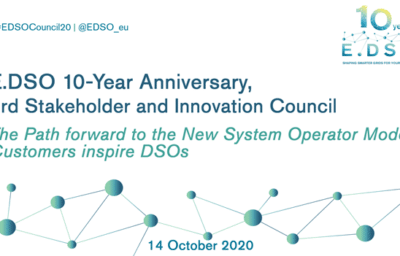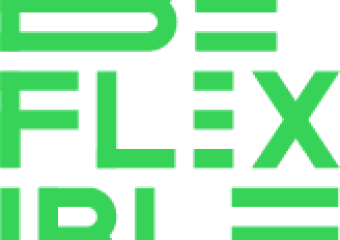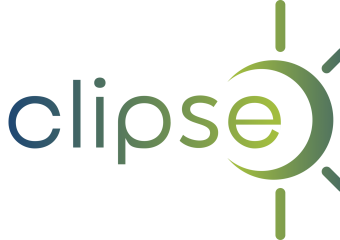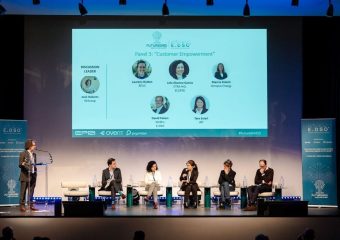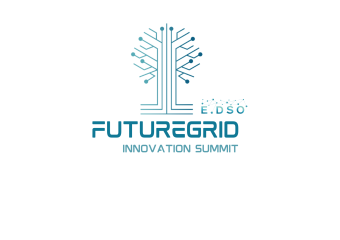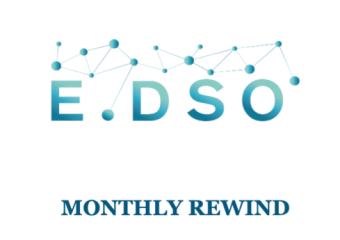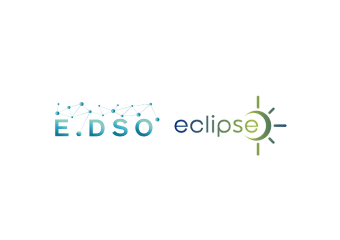E.DSO celebrates 10-year anniversary and hosts 3rd Stakeholder and Innovation Council
15 October 2020
“ ‘EDSO for smart grids’ is now E.DSO. No need to mention ‘smart grids’ anymore, smartness is part of our identity.” With those words, E.DSO Chair Christian Buchel opened the celebrations of the association’s 10-year anniversary. He is referring to the change of the name and brand two years ago. Back then, the new logo and name were unveiled at the very first Stakeholder and Innovation Council, in November 2018, one of the many milestones of the past ten years.
This year’s edition of the Stakeholder and Innovation Council, which was organised in the context of the 10-year anniversary, had to be held as an online event amid the ongoing Corona pandemic. Nonetheless, many of the founders and friends of E.DSO took it upon themselves to connect and raise a virtual toast. Some of the congratulations have also been compiled in a video.
Starting as a club of 11 CEOs, E.DSO is now gathering 41 leading electricity distribution system operators (DSOs) in 24 countries all over Europe, including 2 national associations, with a well-established secretariat in Brussels. The association and its members represent more than 350 million customers with no less than 7 million kilometers of distribution lines. Its 10 full-time staff members are involved in policy, projects and innovation. Since its creation, E.DSO has been involved in more than 10 EU-funded projects and initiatives, published around 100 reports and organised about 30 public events and workshops in Brussels and other European cities.
Livio Gallo, Chairman of the Stakeholder and Innovation Council and former Head of the Enel Group’s Global Infrastructure and Networks, is one of the founding members, too, and has been the association’s first Chair. He recalled the successful journey of the association and the work of the Stakeholder Council since its inception in 2018. It was established with the idea to help E.DSO and its members:
- To design the evolution of DSO models
- To create value for citizens and society, industry, customers, and stakeholders
- To provide advice and inspiration to E.DSO
- To bring views outside-in, sharing new visions on industry and technology in transition and reflecting on possible and forward-looking DSO and E.DSO strategies
The Council members are eminent authorities in their respective fields; experts in regulation, customer behaviour and new technologies. Accordingly, this year’s edition focused on ‘The Path forward to the New System Operator Model – Customers inspire DSOs’. Three subgroups elaborated results throughout the past weeks and months, which were presented in this public webinar:
- Topic 1: Societal values to be embedded in the New System Operator Model
- Topic 2: Current market model and regulatory facilitation for customers
- Topic 3: Innovative tools/instruments to implement the New System Operator Model
For the first topic, Joisa Saraiva, Director of the Center for Regulation and Infrastructure, Fundação Getulio Vargas, and Ronnie Belmans, Professor at KU Leuven and CEO of Energyville presented the discussion results: Societal values differ across stakeholders. Some of the most generic societal values include:
- Ensuring comfort; enabling citizens to enjoy their life the way they want
- Sustainability and combatting climate change; mitigating its effects
- Maintaining environmentally friendly surroundings, free of pollution in a broad sense and within the spirit of the circular economy
It is the task of the DSOs to promote these values by:
- Guaranteeing sustainability, resilience and reliability of the network
- Facilitating deployment of new technologies
- Supporting establishment of new markets, as neutral facilitators, to promote the alignment of stakeholders’ actions and minimize societal cost
For subgroup 2, Dan Delurey, President of Wedgemere Group and Philip Lewis, CEO of VaasaETT entered the virtual stage. Philip Lewis stated among other things that incentives alone (minor savings on energy bills) do not stimulate sufficient behavioural change and that we cannot have a future based only on punitive measures. Through timely actionable information (provided to consumers and other actors) relating to the impact of consumption behaviour on emissions, along with an easy way to respond, we can avoid unnecessary restriction or financial burden to consumers. Dan Delurey added some further observations and considerations from the U.S.:
- Dynamic relocation of demand due to the pandemic
- Storage as a competitor to demand response; Moveable storage effect of EVs;
- Electrification via reduction of natural gas
- Environmental justice
- Resiliency of the grid and personal resiliency actions
The results of subgroup 3 were presented by Mark McGranaghan, Vice President of Innovation at EPRI, the Electric Power Research Institute. The subgroup concluded that the future digital energy system involves many challenges, but they also explained what needs to be done: pursuing technologies to achieve an integrated, balanced, and sustainable smart ecosystem through regular investments in the transformation of the networks and by partnering at different levels with all users. This will enable a participatory, responsible, and effective approach to the overall energy transition process.
Following a Q&A round in which experts answered questions on the potential role of gas as a transitional fuel, education for the energy transition (what do consumers really need to know?), sharing and use of meter and sub-meter data, Paolo Gallo, CEO of Italgas and Chair of the gas distributors’ association GD4S, provided some interesting insights on the topic of Energy System Integration.
The 10-year anniversary webinar and 3rd Stakeholder Council were concluded by Manuel Sanchez, Team Leader for Smart Grids at the European Commission’s Directorate-General for Energy. He congratulated E.DSO with its round birthday, recalled the good cooperation with the Commission throughout the years, and wished a lot of success and good continuation of the work in the future.
The Council conclusions will be made publicly available in due time. The presentations are available here.
E.DSO thanks all Stakeholder Council members, speakers, contributors and attendees for participating in this webinar.
——————–
External members of the 3rd E.DSO Stakeholder and Innovation Council:
- Ronnie Belmans (KU Leuven, Energyville)
- Alberto Pototschnig (Florence School of Regulation)
- Dan Delurey (Wedgemere Group)
- Philip Lewis (VaasaETT)
- Simona Maschi (Copenhagen Institute of Interaction Design)
- Leonardo Meeus (Florence School of Regulation & Vlerick Business School)
- Mark McGranaghan (EPRI – Electric Power Research Institute)
- Joisa Saraiva (Center for Regulation and Infrastructure, Fundação Getulio Vargas)
- Jorge Vasconcelos (NEWES – New Energy Solutions)
- Christof Wittwer (Fraunhofer Institute for Solar Energy Systems)
#EDSOCouncil20

